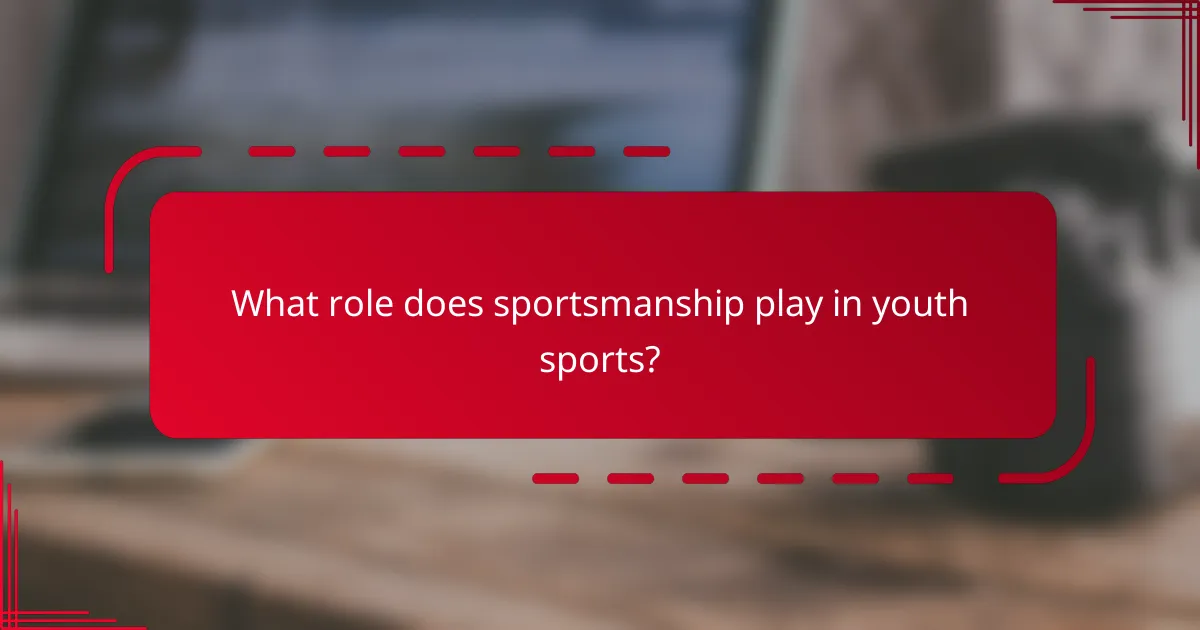Encouraging teamwork and sportsmanship in young athletes is vital for their development both on and off the field. By fostering an environment that emphasizes collaboration and respect, coaches and parents can help young players learn essential life skills while enhancing their athletic performance. Promoting positive interactions and fair play not only benefits the team dynamic but also instills values that will serve them throughout their lives.

How can coaches promote teamwork in young athletes?
Coaches can promote teamwork in young athletes by creating an environment that emphasizes collaboration, communication, and shared objectives. This approach not only enhances athletic performance but also builds essential life skills.
Implement team-building exercises
Team-building exercises are activities designed to strengthen relationships among team members. These can include trust falls, obstacle courses, or group challenges that require collaboration to succeed. Regularly incorporating such exercises can help athletes learn to rely on one another.
Consider scheduling these activities during practice sessions or at team retreats. Aim for a mix of physical and mental challenges to cater to different strengths within the team.
Encourage open communication
Open communication is vital for fostering teamwork. Coaches should create an atmosphere where athletes feel comfortable sharing their thoughts and concerns. Regular team meetings or feedback sessions can facilitate this exchange.
Encourage athletes to express their ideas and listen to each other. This practice not only builds trust but also helps resolve conflicts before they escalate.
Set collective goals
Setting collective goals helps unify the team around a common purpose. Coaches should involve athletes in the goal-setting process, ensuring that everyone understands and commits to these objectives. Goals can range from winning a specific number of games to improving individual skills.
Regularly revisit these goals to assess progress and make adjustments as needed. This keeps the team focused and motivated throughout the season.
Foster a supportive environment
A supportive environment encourages athletes to take risks and learn from mistakes. Coaches should promote positivity, celebrating both individual and team achievements. Recognizing effort, not just results, helps build confidence among young athletes.
Encourage teammates to support one another during practices and competitions. Simple gestures, like high-fives or words of encouragement, can significantly enhance team morale.
Model teamwork behavior
Coaches play a crucial role in modeling teamwork behavior. By demonstrating collaboration and respect in their interactions, coaches set a standard for athletes to follow. This includes showing appreciation for each team member’s contributions.
Engage in team activities alongside the athletes to reinforce the importance of teamwork. When coaches actively participate, it sends a strong message about the value of working together.

What role does sportsmanship play in youth sports?
Sportsmanship is essential in youth sports as it fosters respect, fairness, and positive interactions among athletes. It teaches young players the importance of playing by the rules and valuing their opponents, which contributes to their overall development both on and off the field.
Builds character and respect
Sportsmanship builds character by instilling values such as integrity, humility, and respect for others. Young athletes learn to appreciate their teammates and opponents, which helps them develop empathy and social skills. For instance, congratulating an opponent after a game, regardless of the outcome, reinforces mutual respect.
Encouraging athletes to acknowledge good plays by others fosters a culture of respect within the team. Coaches can facilitate this by modeling respectful behavior and creating opportunities for athletes to express appreciation for each other’s efforts.
Enhances enjoyment of the game
When athletes practice sportsmanship, it enhances their enjoyment of the game by creating a positive environment. Players are more likely to have fun when they feel respected and valued, leading to a more fulfilling experience. This enjoyment can motivate them to continue participating in sports throughout their lives.
Coaches can enhance enjoyment by emphasizing teamwork and collaboration over competition. Organizing team-building activities or friendly matches can help athletes bond and appreciate the game more, making it less about winning and more about shared experiences.
Encourages fair play
Fair play is a cornerstone of sportsmanship, ensuring that all athletes compete under the same rules and conditions. Teaching young athletes about the importance of honesty and integrity in competition helps them understand that winning at all costs is not acceptable. This mindset promotes a healthier approach to sports.
To encourage fair play, coaches should establish clear expectations and consequences for unsportsmanlike behavior. Regular discussions about the value of fair play and recognizing athletes who exemplify these traits can reinforce this principle within the team culture.

How can parents support teamwork and sportsmanship?
Parents can play a crucial role in fostering teamwork and sportsmanship among young athletes by actively engaging in their sports activities and promoting positive behaviors. This support can significantly enhance their children’s experiences and development in team settings.
Encourage positive reinforcement
Positive reinforcement helps young athletes understand the value of teamwork and sportsmanship. Praising efforts, good sportsmanship, and collaborative plays can motivate children to continue exhibiting these behaviors. For instance, acknowledging when a player assists a teammate can reinforce the importance of working together.
Consider using specific praise, such as, “I loved how you passed the ball to your teammate instead of taking the shot yourself.” This approach not only boosts confidence but also emphasizes the significance of teamwork.
Attend games and practices
Being present at games and practices allows parents to model supportive behavior and show their commitment to teamwork and sportsmanship. When children see their parents cheering for all players, it reinforces the idea that supporting each other is essential, regardless of the outcome.
Make it a point to engage with other parents and athletes during these events. This interaction can create a community atmosphere that values collaboration and respect, further encouraging young athletes to adopt these principles.
Discuss the importance of teamwork
Regular conversations about teamwork can help young athletes understand its significance both in sports and in life. Discuss scenarios where teamwork led to success, whether in sports, school projects, or family activities. This context can help children appreciate how working together can achieve common goals.
Encourage children to share their thoughts on teamwork and sportsmanship after games. This reflection can deepen their understanding and commitment to these values, making them more likely to practice them in future situations.

What activities can enhance teamwork among young athletes?
Activities that promote teamwork among young athletes include group training sessions, team sports competitions, and community service projects. These activities foster collaboration, communication, and a sense of belonging, which are essential for developing sportsmanship and teamwork skills.
Group training sessions
Group training sessions are designed to encourage athletes to work together towards common goals. These sessions can include drills that require teamwork, such as relay races or partner exercises, which help athletes learn to rely on each other.
Coaches should focus on creating a supportive environment where athletes can communicate openly. Incorporating team-building activities, like trust falls or problem-solving challenges, can further enhance cooperation and camaraderie.
Team sports competitions
Participating in team sports competitions is a direct way to cultivate teamwork among young athletes. These events require players to strategize and collaborate to achieve success, reinforcing the importance of working together.
Encouraging athletes to celebrate each other’s achievements, regardless of individual performance, can strengthen team bonds. Coaches should emphasize the value of sportsmanship, teaching athletes to respect opponents and support teammates during both victories and defeats.
Community service projects
Engaging in community service projects allows young athletes to work together outside of their sports environment. These projects can include organizing local events, volunteering at shelters, or participating in environmental clean-ups, fostering a sense of unity and shared purpose.
Such activities not only build teamwork but also instill values of empathy and responsibility. Coaches and parents can facilitate these projects by helping athletes identify causes they are passionate about, ensuring that the experience is meaningful and impactful.

What are effective strategies for teaching sportsmanship?
Effective strategies for teaching sportsmanship involve creating an environment where young athletes can learn the value of fair play, respect, and teamwork. By incorporating practical activities and discussions, coaches can instill these principles in a way that resonates with young athletes.
Use role-playing scenarios
Role-playing scenarios are an engaging way to teach sportsmanship. By simulating game situations, athletes can practice responding to various challenges, such as losing gracefully or congratulating opponents. This hands-on approach helps them internalize the importance of good sportsmanship in real-life contexts.
Consider setting up scenarios where athletes must navigate conflicts, such as a teammate making a mistake or an opponent celebrating a win. Discussing their choices afterward reinforces the lessons learned and encourages reflection on their behavior.
Discuss sportsmanship in team meetings
Regular discussions about sportsmanship during team meetings can reinforce its importance. Use these meetings to highlight what good sportsmanship looks like and why it matters for team cohesion and personal growth. Encourage athletes to share their thoughts and experiences related to sportsmanship.
Incorporate specific examples from recent games or practices to make the conversation relevant. This approach not only fosters open communication but also allows athletes to learn from each other’s perspectives.
Highlight examples of good sportsmanship
Highlighting examples of good sportsmanship can serve as powerful motivation for young athletes. Recognize and celebrate instances where players demonstrate respect, teamwork, and integrity, whether during games or practices. This recognition can be done through awards, shout-outs, or team newsletters.
Additionally, share stories of professional athletes who exemplify sportsmanship. Discussing these role models can inspire young athletes to emulate similar behaviors, reinforcing the idea that sportsmanship is valued both on and off the field.

How can schools integrate teamwork into sports programs?
Schools can effectively integrate teamwork into sports programs by designing activities that promote collaboration and communication among young athletes. This can be achieved through structured practices, team-building exercises, and a focus on collective goals.
Develop a teamwork curriculum
Creating a teamwork curriculum involves incorporating specific lessons and activities that emphasize the importance of working together. Schools should outline objectives that highlight skills such as communication, trust, and conflict resolution within a sports context.
For example, coaches can introduce drills that require players to rely on each other to complete tasks, such as relay races or cooperative challenges. This not only enhances athletic skills but also fosters a sense of camaraderie among team members.
Additionally, regular discussions about teamwork during practice can reinforce these concepts. Coaches might use scenarios from games to illustrate successful teamwork or areas needing improvement, helping athletes understand the value of collaboration in achieving success.
